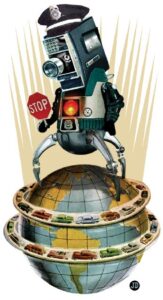… but everyone gets one at some point. Most of us probably don’t experience the sinking dread of flashing red lights in our rearview all that often. But with the shiny black lenses of red-light cameras going up at major intersections all over the city, a new kind of dread sets in. Watch the flashes pop in rapid succession as the light changes. Are every one of those pops a ticket—an expensive ticket? When will one be destined for your mailbox? Who gets all that money, anyway? What if we can’t afford the ticket? And can we protect our plates against those prying lenses?
From Prying Eyes
Mark Perea says he sells PhotoBlocker Spray "like it’s going out of style." Some of his biggest customers? Cops, says Perea, owner of The Spy Shop at 3023 Central. "Officers come in here like, ‘We need to get that stuff for our squad cars, dude.’ Seriously."PhotoBlocker products claim to prevent red-light cameras from being able to accurately record your plate’s digits. Three main products make promises of big results:1) The spray is hawked by a handful of shops in Albuquerque. According to the manufacturer’s site at photoblocker.com, you only have to coat your plate with the stuff once. The resulting gloss is said to reflect the high-powered flash right back at the camera, making your plate unreadable in the picture. Your license plate won’t look different to the naked eye, according to the manufacturer. This stuff goes for $30 a pop on the site.2) The same reflecting principal applies to the PhotoShield Cover, "a thin diffusion lens" designed to be inconspicuous, the manufacturer says. This cover costs $25.3) The Reflector Cover is plastic with "light-reflecting crystals" embedded in it that, again, are said to use the flash against the camera. This costs about $20.Should PhotoBlocker products be relegated to the rip-off pile atop "lose 50 pounds tomorrow!" pills and tonics for your love life? Online tests of the sprays and shields yield mixed results. Here’s a better question: Are these blockers legal?First things first, Perea swears by the spray. "I have three vehicles," he says. "I have it on all three.” However, he says, fog, snow or rain prevent the spray from working properly if the photo is taken at close range. For instance, if a van equipped with a speed camera is parked on the side of the road and you pass that van driving close to the curb, the camera might be able to document your license plate. Albuquerque Police Department spokesperson John Walsh is sure the products are a waste of cash. He says Albuquerque’s cameras have taken pictures of plates that obviously have some kind of blocking agent on them, and all it does is make the letters and numbers more clear. "We haven’t seen anything that’s obstructed it, short of somebody physically obstructing the view," he said.The Alibi wanted to do a test using one of the van’s speed cameras in a parking lot to see if the shielding products work or not. Though APD at first seemed cooperative, in the end, the test was not to be. "Can you think of a reason why a police department would want to?" Walsh asked. "We wouldn’t have a purpose to test the product." The police department has never done its own testing of the blocker products, Walsh says. Perea points out that APD has a good reason not to test—what if they work?The Spy Shop won’t carry the plastic covers because Perea says he’s heard people get stopped for them. He’s positive the spray works, though. Before you take your chances on any product, know this: The blockers are not exactly illegal, but they aren’t totally legal, either. "What it comes down to essentially is that statutes have not caught up to technology again," says Phil Sisneros, communications director for the state attorney general. "It’s so new that there do not appear to be any specific laws against red-light camera products." Sisneros says there are rules in the Motor Vehicle Code that make it illegal to drive around with an obstructed plate. According to the code: you can get a ticket for an illegible plate; a license plate must be visible and free of foreign matter; a plate must be visible from 100 feet away at night. "You put all those together once again, and they clearly don’t address red-light camera products that make plates supposedly invisible," Sisneros says. If the products work the way they claim to, Walsh says, it’s possible that they could be considered an obstruction. What if an officer’s headlights reflect off your shielded plate, causing it to be illegible? he asks. "If it obstructs, it obstructs," Walsh says. And if it does, that’s against the laws we already have.Sisneros concurs. "What the code does is it gives the discretion to the police officer as to whether or not the license plate is readable," he says. Still, it’s not clear if New Mexico laws quite cover a product that’s invisible to the naked eye but interferes with visibility on film. Again, whether such a product actually works as advertised is also up for debate. The Attorney General’s Office hasn’t received any complaint or inquiry about the shields and sprays, Sisneros notes. "If some of these products and their claims are shown to be bogus, that could end up being the basis for a consumer complaint, which of course the Attorney General’s Office does handle."






